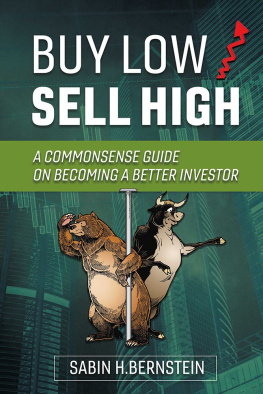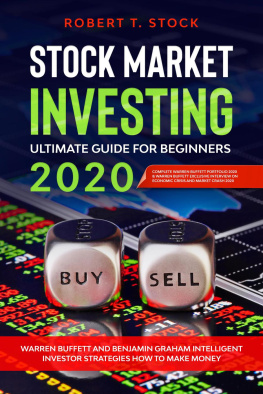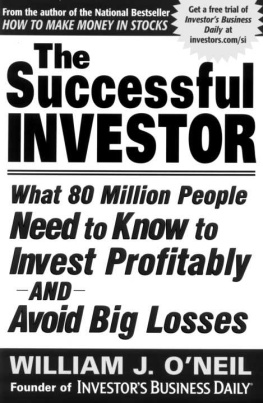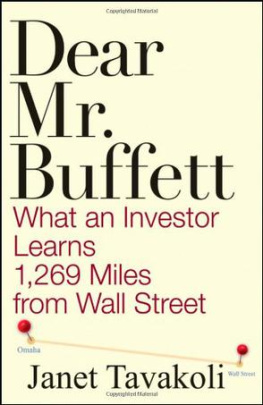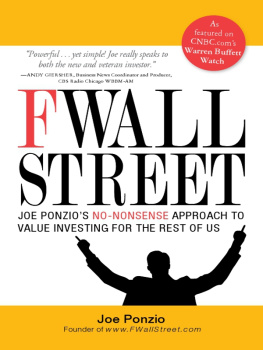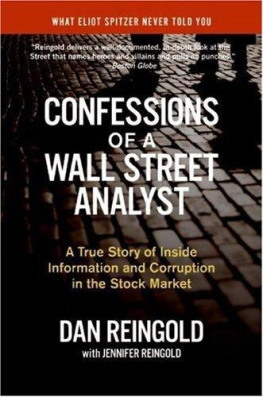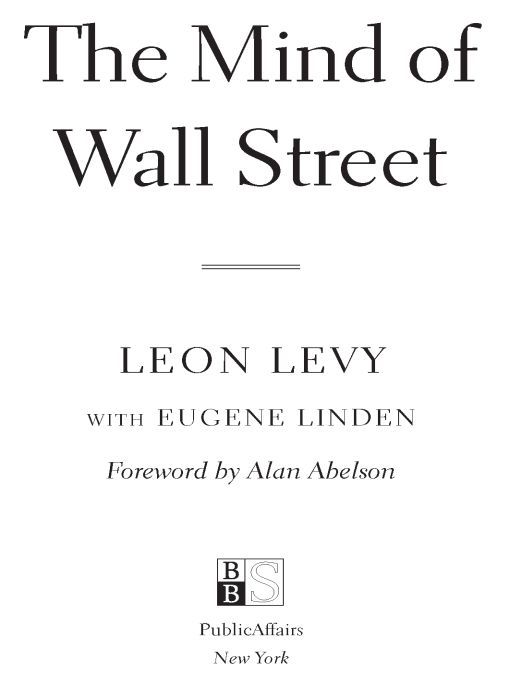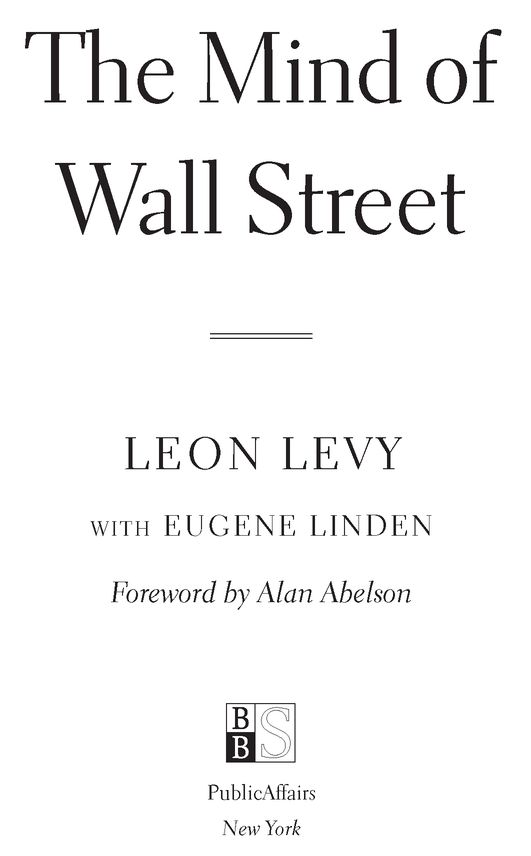Table of Contents
To my father, Jerome,
and to my brother, Jay,
and my nephew, David,
who have kept the flame
of Dads economics alive
Foreword
by Alan Abelson
WALL STREET has a lot to answer for. In the late 1990s, it filled the popular imagination with dreams of avarice and seduced otherwise sane human beings into indulging in a once-in-a-generation orgy of speculation. In the process, it suborned accountants, turned stock analysts into shills, and aided and abetted the machinations of the worst and sleaziest of corporate America. But perhaps the most unforgivable of its many monstrous sins has been to inspire scores of bad books by bored billionaire investors, eager to inflict on the masses every detail of their tinsel triumphs and vapid ruminations.
So far as I can determine, there has been no scientific study of the origin of this extraordinary outbreak of truly terrible books by authors, who, besides an ability to accumulate an enormous amount of money, are distinguished primarily by an inexplicably high regard for themselves. Whatever their virtuesand everybody presumably has some, after allcoherence of thought and clarity of expression are not prominent among them. Not a few, in fact, offer living proof that not only can illiterates function, but they can prosper as well.
In any case, what the world surely doesnt need is another bad book. Especially another bad investment book. There already are more than enough to satisfy even the most masochistic taste, and every day their numbers swell. If this seems a peculiar way to begin an admiring note on The Mind of Wall Street and its remarkable author, Leon Levywell, yes, it certainly is. Yet, not the least of this books appeal is that it is so strikingly different from the run-of-the-mill efforts dribbled out by the Wall Street illiterati, just as Leon Levy stands out as a man conspicuously apart from the ordinary successful investment professional.
Part financial memoir by an unfailingly curious and uncommonly insightful spectator, part subtle and pragmatic investment guide by a master investor, and part examination of human psychology as one of the dominant movers and shakers of markets, this book is as removed from a dry-as-dust academic treatise as Heaven is from Hades. More than that, its pure Leon: discursive at times, informed and witty, and absent the slightest trace of condescension. And it is spiced from first to last with a liberal seasoning of anecdote about this tumultuous and extraordinary eras great financial personages and great financial rogues (I run the risk here of being redundant), many of whom Leon observed up close and with not a few of whom he engaged in hand-to-hand combat.
Transparency is all the rage these days, so in the interest of full disclosure I might as well fess up to some intimate details of my relationship with Leon Levy. Leon and I have known each other since high school and college. The qualities that make Leon such a terrific human beingwarmth and generosity, profound intelligence, wonderfully self-deprecating humor, unflagging curiosity about just everything in the wide world, and a way of looking at things from an often revealingly askew perspectiveanimate his narrative. The boy, I guess, is father to the man, and just about all these qualities were visible when we were in Townsend Harris High School together sixty years ago. Notably among them was a certain abstracted air that Leon refers to in his book as usually taken for absent-mindedness. He slyly insists he wasnt absent-minded at all, but merely thinking of other things.
That Leon is a brave fellow is attested to by his choice of a title: The Mind of Wall Street. Man, talk about serving up a straight line! Typically Leon, though, is his preemptive riposte to the obvious cracks that would inevitably greet the coupling of mind and Wall Street. Hes quick to explain he was uniquely qualified to examine the mind of Wall Street in light of the fact that in college he received an A+ in abnormal psychology.
For both the economy and the stock market, the roughly fifty years that the book spans were epochal in every sense of the word. Their massive embrace, so adroitly and flavorfully described by Leon, took in a fecundity and variety of change that was as bewildering as it was breathtaking. Not the least of the momentous events that were to shape those fifty years occurred early on, when the Depression mentality that had instilled such restraint on both the economy and the stock market finally was dissipated.
The decades that followed were about evenly marked by innovation and excess, explosive growth and corrosive slump. Just as they were in the real world, the 1960s on Wall Street were a hyper time. They started with a speculative frenzy that went bust and they ended with an even more frenetic speculative frenzy that went bust. In many ways, the 1960s were a dress rehearsal for the late 1990s: the celebration of money managers as contemporary heroes, the discovery by the captains of commerce and industry of the uses of accountancy to kit their stock, the lust for acquisitions to create the illusion of growth, the craze for IPOs and all the evils that issued from it, the shuttle of speculative contagion that ran back and forth between Wall Street and corporate America.
The 1970s began as an exacerbation of the 1960s, but more concentrated, and then ended up as their economic and investment polar opposite. The decade featured the devaluation of the dollar and the oil embargo, both of which helped touch off an astonishing commodity inflation that flared for the better part of the decade and manifested itself most amusingly and insanely in the rage for all manner of collectibles, from comic books to gold coins.
The 1980s, for their part, and with the always handy advantage of hindsight, were a mini-preview of the opening years of this new century. Most particularly, the scintillating sight they afforded was of tycoons in handcuffs (the tycoons then happened to be big Wall Street traders and the more recent tycoons happened to be big corporate CEOsbut theyre certainly the same under the skin). The decade also was a huge incubator of financial engineering that enhanced humanity with such marvelous artifacts as junk bonds and offered absolute immunity to investors with that ingenious device known as portfolio insurance (see the events of October 19, 1987).
The great bubble mania of the 1990s that infected half the population is still fresh in memory, the debris of its bursting still very much in evidence. The wounds to the economy and to millions of investors are still deep and raw. It was as if the whole country went nuts for four or five yearsgreat fun for a professional spectator like me and perfect material for anyone with an abiding interest in abnormal psychology like Leon.
As all the foregoing suggests, gentle skeptic that he is, a tolerant, amused but sharp and anthropological observer, Leon couldnt have chosen a more fertile fifty years to immerse himself in Wall Street. And the yield from that immersion for the reader of this book is absolutely bountiful. It has, to cite one example among so many, the best, most concise, and clearest explanation for the collapse of Long-Term Capital Management that threatened to unhinge the entire global financial system.
But the real treat for the reader of The Mind of Wall Street



